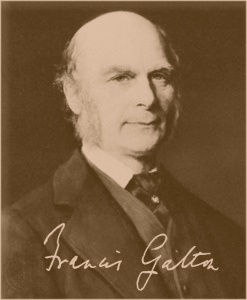The Wisdom of Composite Crowds
April 27, 2017
Physical scientists are able to control their
experiments quite closely.
Chemists will choose
pure materials for their
reactions, and
physicists will undertake measurements under
precise temperature,
pressure, and other conditions. Experiments in many of the
life sciences are seldom as precise, since they're conducted on
organisms that are not precisely equivalent from one individual to another. It's only by doing experiments on many organisms, and
analysis of the data by
statistics, that those
disciplines can transcend what
Rutherford called "
stamp collecting."[1]
Statistics are important when we venture away from
science and into the realm of
opinion; but, as the performance of some
opinion polls for the last
US Presidential election reminds us, the
methodology can be tricky. However, it appears the the
composite opinion of large numbers of properly selected people will give us a better answer to a question that of a few individuals.
While
Aristotle (384 BC-322 BC) alludes to the
idea of the "
wisdom of the crowd" in his
Politics (see figure),[2]
Victorian polymath,
Francis Galton (1822-1911) was the first to apply this concept statistically. In 1906, Galton
observed a contest at a
livestock fair in which 800 visitors guessed the weight of
meat that would be produced by a particular
ox.

"For it is possible that the many, though not individually good men, yet when they come together may be better, not individually but collectively, than those who are so..."(Aristotle, Politics, Book III, Section 1281a41-1281b1, via the Tufts University Perseus Digital Library.[2]
Although people who would have attended such a livestock fair a hundred years ago would have had a reasonable knowledge of what a
pound weight of meat would looked like "on the hoof," no individual guessed the exact weight, and there was quite a
range of estimates. Galton found that the
mean of the 800 guesses was within a
pound of the actual weight of 1,197 pounds; that is, the mean was within 0.1% of the actual value.

Photograph of Francis Galton (1822-1911), with signature.
Galton was a Victorian polymath best known to scientists as the originator of the statistical concept of correlation.
He is known to most others for coining the term, eugenics, for a concept that goes back to Plato.
(image source and signature source, via Wikimedia Commons.)
Fast-forward a little more than a
hundred years for an
experiment similar to Galton's wisdom of crowds observation.
Stefan Krause of the
Lübeck University of Applied Sciences in
Schleswig-Holstein, Germany and his
colleagues asked visitors to a
museum to guess the number of
marbles in a
jar.[3-6] This
research team did a
statistical analysis of the results that went beyond Galton's average.[3]
Since there were more than 2,000 responses, they were able to make
random groups from the total and determine the average for these groups. The result was that groups of forty or more had a better average guess than the top
quartile of individual guesses. In other words, groups of forty ranked at the 99th
percentile of performers, a result consistent with Galton's.[3]
Galton's initial crowd wisdom observation and the marble experiment have the common feature that the guesses are made in isolation. Recent research by scientists at
University College London (London, UK), the
Universidad Torcuato Di Tella (Buenos Aires, Argentina), and
TED (Buenos Aires, Argentina) have examined how the wisdom of crowds can be increased by discussion within members of a group.[7] The group members still get their own vote, but the vote is informed by the discussions.[7]
Statisticians would likely agree that the best results in a collective wisdom study would arise from independent voting, principally because the accuracy of a statistical prediction increases with the number of observations. This study demonstrated that deliberation and discussion improved the collective wisdom.[7] The researchers had a crowd of 5,180 people answer some simple questions, such as the
height of the
Eiffel Tower, answering independently, or after discussions in groups of five.[7] It was found that the estimates given after discussions were more diverse, and the average more accurate.[7]

Educated guessing.
Scientists make educated guesses, so their approach to guessing the number of objects in a jar differs from that of most people.
A random packing of spheres will occupy about 2/3 of the volume of a space, while ellipsoidal objects, such as the olives shown, will pack about 3/4 of the volume.
I discussed packing in a previous article (Packing, November 30, 2010).
(Wikimedia Commons image.)
A different way to improve crowd wisdom was discovered by researchers from the
Massachusetts Institute of Technology (Cambridge, Massachusetts) and
Princeton University (Princeton, New Jersey).[8-10] The technique, which they call the "surprisingly popular"
algorithm, is based on asking each participant two questions.
The first question is what the participant thinks is the right answer, while the second asks what the
popular answer will be. Looking at the difference between these answers allows choice of the better answer.[10] Says
Drazen Prelec, a paper
co-author and MIT
professor, "In situations where there is enough information in the crowd to determine the correct answer to a question, that answer will be the one [that] most outperforms expectations."[10]
The team polled the participants with simple yes/no questions, some examples of which appear below.[9]
Readers of this
blog will certainly have no difficulty answering questions 4, 7, 8, and probably 10. I had convictions about some of the others, but no direct knowledge of any of those answers. I did have an objection to question 4, since those
constants do not have the same
units. The reason why the "surprisingly popular" method works is that some people in the crowd have specialized knowledge, they are sure of their answer, and they are confident of what the typical wrong answer would be.
As a simple example, consider one question that the research team posed; namely, whether
Philadelphia is the
capital of
Pennsylvania.[10] While Philadelphia is not Pennsylvania's capital, most people think that it is (The same can be said of
New York City's being the capital of
New York State, whose capital is actually
Albany). People who thought that Philadelphia was the capital also thought that others would give the same mistaken answer.[10]
Those who answered
Harrisburg, the actual capital, also thought that others would choose Philadelphia, so there was a divergence of answers to these questions between the groups.[10] The expectation that the most popular answer would be Philadelphia exceeded the actual number of answers, and this directs us to the correct answer.[10]
It was found that the "surprisingly popular" algorithm reduced errors by 21.3 percent compared to
simple majority voting.[10] As
John McCoy, a
Ph.D. candidate in the
MIT Department of Brain and Cognitive Sciences, explains, "A lot of crowd wisdom weights people equally... But some people have more specialized knowledge."[10]
References:
- "All science is either physics or stamp collecting," Ernest Rutherford, as quoted by J. B. Birks, via Wikiquote.
- Aristotle's Politica (in Greek), W. D. Ross, Ed., Clarendon Press (Oxford, 1957) via the Tufts University Perseus Digital Library, Gregory R. Crane, Ed.. English translation: Aristotle in 23 Volumes, Vol. 21, H. Rackham, Trans.,Harvard University Press (Cambridge, MA, 1944).
- Stefan Krause, Richard James, Jolyon J. Faria, Graeme D. Ruxton and Jens Krause, "Swarm intelligence in humans: diversity can trump ability," Animal Behaviour, vol. 81, no. 5 (May, 2011), pp. 941-948.
- Study finds that diversity can trump ability, University of Bath Press Release, April 21, 2011.
- Research Highlights-Behaviour: Diversity beats ability, Nature, vol. 472, no. 7343 (April 21, 2011) p. 263.
- Study finds that diversity can trump ability, Physorg, April 21, 2011.
- Joaquin Navajas, Tamara Niella, Gerry Garbulsky, Bahador Bahrami, and Mariano Sigman, "Deliberation increases the wisdom of crowds," arXiv, March 2, 2017.
- Drazen Prelec, H. Sebastian Seung, and John McCoy, "A solution to the single-question crowd wisdom problem," Nature, vol. 541, no. 7638 (January 26, 2017), pp. 532-535, doi:10.1038/nature21054.
- Supplementary information for ref. 8 (PDF file).
- Peter Dizikes, "Better wisdom from crowds," MIT Press Release, January 25, 2017.
Permanent Link to this article
Linked Keywords: Physical science; physical scientist; experiment; chemist; purity; pure; material; chemical reaction; physicist; precision; precise; temperature; pressure; life science; organism; data analysis; statistics; discipline; Ernest Rutherford; stamp collecting; science; opinion; opinion poll; United States presidential election; methodology; composite; Aristotle (384 BC-322 BC); idea; wisdom of the crowd; Politics (Aristotle); Victorian era; polymath; Francis Galton (1822-1911); contest; livestock; fair; meat; ox; Tufts University Perseus Digital Library; pound weight; range (statistics); arithmetic mean; correlation; eugenics; Plato; Wikimedia Commons; century; hundred years; experiment; Stefan Krause; Lübeck University of Applied Sciences; Schleswig-Holstein, Germany; colleague; museum; marbles; jar; research; statistical analysis; randomness; random; quartile; percentile; University College London (London, UK); Universidad Torcuato Di Tella (Buenos Aires, Argentina); TED (Buenos Aires, Argentina); height; Eiffel Tower; educated guess; random close pack; random packing; sphere; volume; ellipsoid; ellipsoidal; olive; Massachusetts Institute of Technology (Cambridge, Massachusetts); Princeton University (Princeton, New Jersey); algorithm; mainstream; popular; Drazen Prelec; co-author; professor; Japan; life expectancy; Nile River; Volga River; Portuguese language; official language; Mozambique; Avogadro's constant; Planck's constant; currency; Switzerland; Euro; Abkhazia; territorial dispute; disputed territory; Georgia (country); chemical symbol; tin; Iron Age; Bronze Age; Schuyler Colfax; Abraham Lincoln; Vice President of the United States; bone; human body; femur; blog; physical constant; unit of measurement; Philadelphia; capital city; Pennsylvania; New York City; New York State; Albany, New York; Harrisburg, Pennsylvania; plurality (voting); simple majority voting; John McCoy; Doctor of Philosophy; Ph.D.; postgraduate education; MIT Department of Brain and Cognitive Sciences; "All science is either physics or stamp collecting."